- Joined
- Feb 26, 2019
- Messages
- 12,449
- Points
- 113
www.channelnewsasia.com
Singapore
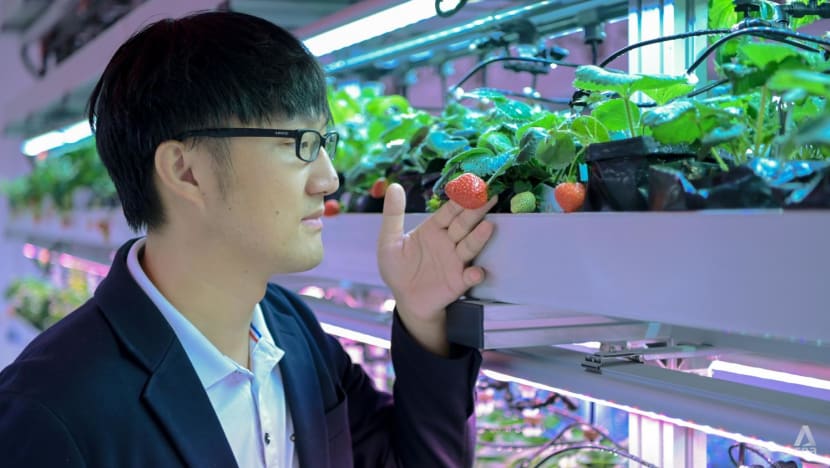 Singrow CEO and co-founder Bao Shengjie monitoring his strawberries in an indoor farm in SIngapore. (Photo: CNA/Hanidah Amin)
Singrow CEO and co-founder Bao Shengjie monitoring his strawberries in an indoor farm in SIngapore. (Photo: CNA/Hanidah Amin)

12 Apr 2023 06:00AM (Updated: 12 Apr 2023 11:47AM)
SINGAPORE: Juicy strawberries, plucked from the vine and into my mouth – this was not something I was expecting to taste in sweltering Singapore.
The strawberries growing at Singrow’s indoor farm at the Science Park are derived from a Japanese varietal, but have been bred to grow in higher temperatures.
The fruit is the yummy result of years of research into how key genes affect plant growth by Singrow CEO and co-founder Bao Shengjie and his team.
The bespectacled scientist, who has a PhD in molecular biology from the National University of Singapore (NUS), is confident that they have developed the world’s first climate-resilient strawberries.
While the fruit usually grows in cooler temperatures of 5 to 15 degrees Celsius, Singrow strawberries can thrive at around 20 to 28 degrees Celsius, said Dr Bao.
“We managed to cross-breed and developed the world's first tropical strawberries, that adapt well to warmer climate conditions.
“So right now, inside this farm, you can say we are growing our strawberries at room temperature,” he said.
While the conditions in an indoor farm can be adjusted, a higher temperature means lower electricity bills. The strawberries will also be resilient to warming due to climate change.
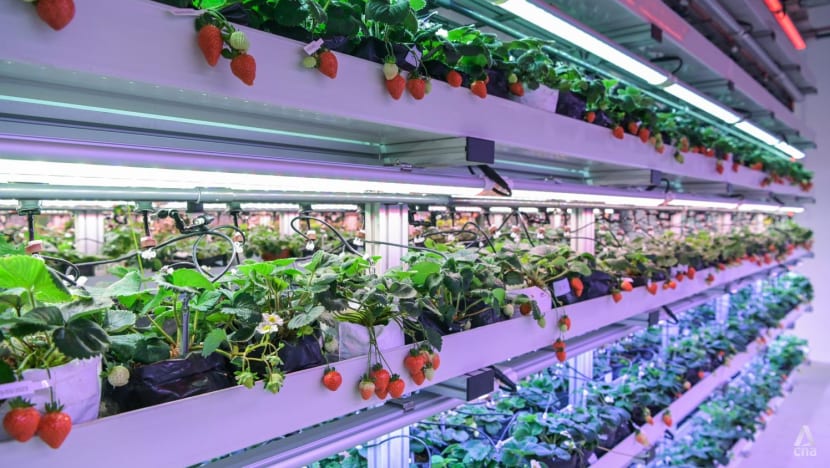 Strawberries in Singrow, an indoor farm in Singapore. (Photo: CNA/Hanidah Amin)
Strawberries in Singrow, an indoor farm in Singapore. (Photo: CNA/Hanidah Amin)
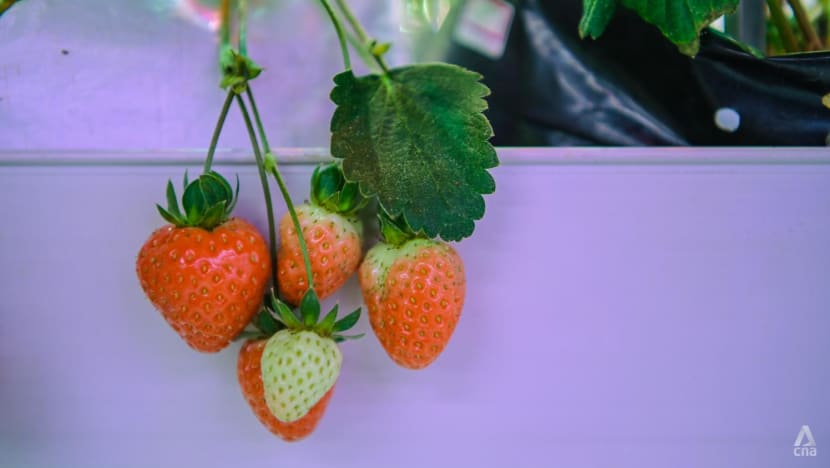 Strawberries at Singrow, an indoor farm in Singapore, on Apr 4, 2023. (Photo: CNA/Hanidah Amin)
Strawberries at Singrow, an indoor farm in Singapore, on Apr 4, 2023. (Photo: CNA/Hanidah Amin)
They also grow faster – going from the nursery to harvest in about two months, or about 30 per cent faster than the norm, said Dr Bao.
That is due to a combination of agri-genomic technology – which accelerates the cross-breeding of the plants – and precision-farming techniques, to better monitor the condition of the plants and optimise their growth.
Singrow has also used its gene technology to ease pollination – which is vital for plump, well-formed strawberries. Aggregate fruit like strawberries have to be pollinated multiple times, and uneven pollination can lead to smaller or mis-shapened fruit.
Said Dr Bao: “We know for certain crops, they are able to pollinate themselves. So we are using similar traits to develop our strawberry variety (so that they have) a higher self-pollination efficiency.
“So, that means we only need to give some minor vibration and wind assistance, and the plants can pollinate themselves.”
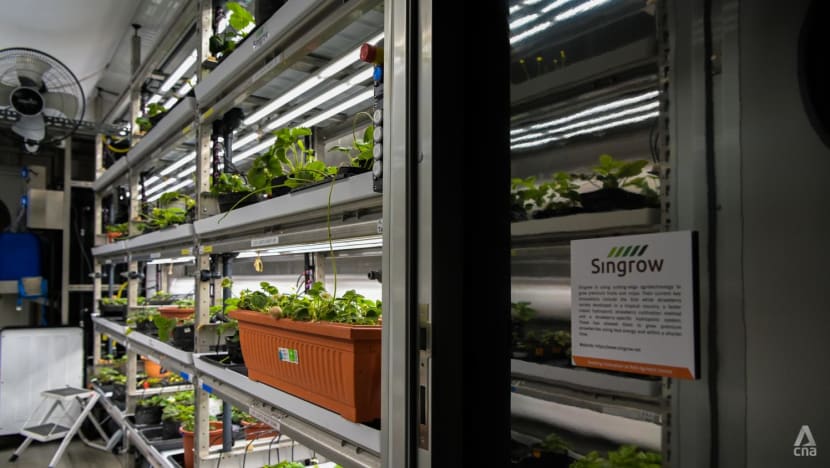 Strawberries are planted in the Singrow nursery before being moved to the farm. (Photo: CNA/Hanidah Amin)
Strawberries are planted in the Singrow nursery before being moved to the farm. (Photo: CNA/Hanidah Amin)
These plants developed through molecular cross-breeding are then monitored with technology that can sense any deviation in their condition, and their growing environment.
One such is a device Dr Bao described is an “e-nose” – it picks up volatile organic compounds emitted by the strawberry plants, much like a human would smell scents in the air.
While such tech has been used in other areas, Dr Bao thinks its application in agriculture is unique. Using data analytics and machine learning, the large volume of data collected is translated into charts that give a picture of the plants’ health.
“We are recording the heartbeat and blood pressure of the plants in such a way we’re able to better monitor plant behaviour and design better and a more precise way to grow our crops.”
Singrow’s chief technology officer Young Chang also showed CNA the PlantEye, a machine at the NUS AgriTech Centre that scans plants to pick up their leaf size, colour, stem length and biomass. It’s part of the shared facilities for urban farming ventures provided by the centre, an initiative by NUS Enterprise. Singrow is one of the start-ups supported by NUS Enterprise.
Mr Chang said that an experienced farmer may be able to detect an anomaly in plant development in about a week – for example by observing that the new leaves are smaller than normal.
But the combination of the technology Singrow employs means they are gathering “real-time information” on the plants’ growth. Mr Chang then “trains” AI programmes to interpret the data collected.
“The purpose is to identify anomalies, so it will give us the warning (and) automatically alert us.”
The growers can then adjust hundreds of settings on the farm – from the nutrient mix, humidity and temperature, to the level of carbon dioxide, the length of time the plants are exposed to light and the wavelength of the light – just to name a few.
“When I presented my first strawberry harvest from the lab to my family, my 10-month-old son finished the whole box of strawberries. So I realised I’m doing something meaningful for society,” he told CNA.
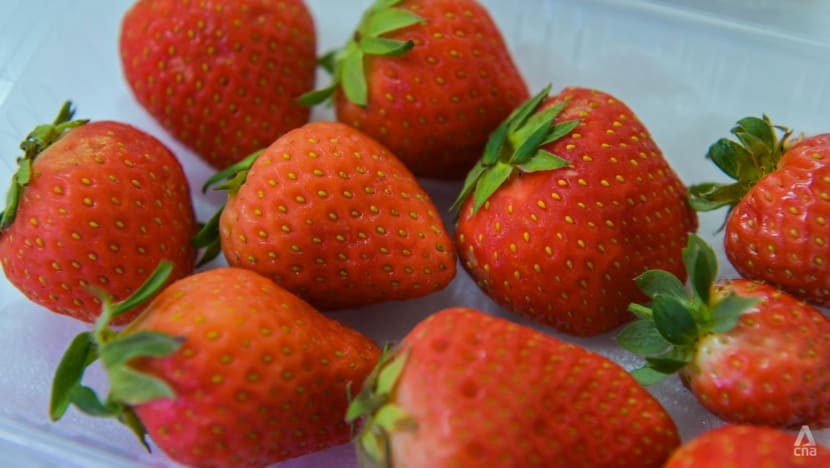 A box of strawberries from Singrow, selling at S$20 to S$26 for a 330g box. (Photo: CNA/Hanidah Amin)
A box of strawberries from Singrow, selling at S$20 to S$26 for a 330g box. (Photo: CNA/Hanidah Amin)
But strawberries are just the testbed for the technology. While Singrow’s small-scale farm supplies to some hotels here and sells its produce online, to ramp up production the agri-tech start-up is providing its plants and tech to larger farms in the region.
On Monday (Apr 11), it signed agreements with two farms – TreeGrow in Malaysia and and PREINO in Thailand – as part of its global expansion plans, and it is also branching out to China.
Singrow will provide the outdoor farms with its crop varieties, starting with strawberries. It will also work with the farms to improve their farming techniques for existing crops, with plans to reduce their fertiliser use by 30 per cent and pesticide use by 70 per cent.
The Singrow Farm at the Science Park, which was officially opened on Monday, will serve as the company's research and development hub.
Besides strawberries, it is also developing 30 other crop varieties, including rice, palm oil, saffron, cherry tomatoes and some types of leafy vegetables.
“The reason we choose all these different crops is, first of all, we see some market pains from current production. And secondly, our technology can be easily adapted to solve these problems for all these given crops.”
For example, 95 per cent of saffron is farmed in one country – Iran – using conventional practices, so the supply and quality are unstable, said Dr Bao.
“In our case, we are able to grow the saffron under a controlled environment,” he said. This has led to a harvest in four months – or about half the time it usually takes.

Dr Bao said that for an ongoing project in collaboration with farmers in China, preliminary data indicates that the farmers were able to reduce the usage of fertilisers and pesticides by 30 per cent while maintaining their yield.
So, how soon can you get your hands on Singrow’s strawberries? Dr Bao said the company is expanding production through a franchise model.
“Eventually we hope to have big enough volume to supply to the supermarkets and make our strawberries more affordable for every Singaporean.”
When both the Malaysia and Thailand farms reach full production, the volume will be more than 100 times higher than Singrow's current production of 500kg a month.
One box of strawberries now costs about S$20 to S$26 (US$15 to US$20) a box but Singrow aims to eventually bring this down to S$12 to S$15.
Singapore
Genetics and AI: The tech that goes into growing strawberries in Singapore
Singrow’s climate-resilient strawberries are a testbed for their agri-genomics and precision farming technology.

12 Apr 2023 06:00AM (Updated: 12 Apr 2023 11:47AM)
SINGAPORE: Juicy strawberries, plucked from the vine and into my mouth – this was not something I was expecting to taste in sweltering Singapore.
The strawberries growing at Singrow’s indoor farm at the Science Park are derived from a Japanese varietal, but have been bred to grow in higher temperatures.
The fruit is the yummy result of years of research into how key genes affect plant growth by Singrow CEO and co-founder Bao Shengjie and his team.
The bespectacled scientist, who has a PhD in molecular biology from the National University of Singapore (NUS), is confident that they have developed the world’s first climate-resilient strawberries.
While the fruit usually grows in cooler temperatures of 5 to 15 degrees Celsius, Singrow strawberries can thrive at around 20 to 28 degrees Celsius, said Dr Bao.
“We managed to cross-breed and developed the world's first tropical strawberries, that adapt well to warmer climate conditions.
“So right now, inside this farm, you can say we are growing our strawberries at room temperature,” he said.
While the conditions in an indoor farm can be adjusted, a higher temperature means lower electricity bills. The strawberries will also be resilient to warming due to climate change.


They also grow faster – going from the nursery to harvest in about two months, or about 30 per cent faster than the norm, said Dr Bao.
That is due to a combination of agri-genomic technology – which accelerates the cross-breeding of the plants – and precision-farming techniques, to better monitor the condition of the plants and optimise their growth.
“HEARTBEAT AND BLOOD PRESSURE” OF PLANTS
Dr Bao explained that Singrow can quickly develop new crop varieties because they know intimately the function of certain genes and how they affect plant growth, flowering and yield.Singrow has also used its gene technology to ease pollination – which is vital for plump, well-formed strawberries. Aggregate fruit like strawberries have to be pollinated multiple times, and uneven pollination can lead to smaller or mis-shapened fruit.
Said Dr Bao: “We know for certain crops, they are able to pollinate themselves. So we are using similar traits to develop our strawberry variety (so that they have) a higher self-pollination efficiency.
“So, that means we only need to give some minor vibration and wind assistance, and the plants can pollinate themselves.”

These plants developed through molecular cross-breeding are then monitored with technology that can sense any deviation in their condition, and their growing environment.
One such is a device Dr Bao described is an “e-nose” – it picks up volatile organic compounds emitted by the strawberry plants, much like a human would smell scents in the air.
While such tech has been used in other areas, Dr Bao thinks its application in agriculture is unique. Using data analytics and machine learning, the large volume of data collected is translated into charts that give a picture of the plants’ health.
“We are recording the heartbeat and blood pressure of the plants in such a way we’re able to better monitor plant behaviour and design better and a more precise way to grow our crops.”
Singrow’s chief technology officer Young Chang also showed CNA the PlantEye, a machine at the NUS AgriTech Centre that scans plants to pick up their leaf size, colour, stem length and biomass. It’s part of the shared facilities for urban farming ventures provided by the centre, an initiative by NUS Enterprise. Singrow is one of the start-ups supported by NUS Enterprise.
Mr Chang said that an experienced farmer may be able to detect an anomaly in plant development in about a week – for example by observing that the new leaves are smaller than normal.
But the combination of the technology Singrow employs means they are gathering “real-time information” on the plants’ growth. Mr Chang then “trains” AI programmes to interpret the data collected.
“The purpose is to identify anomalies, so it will give us the warning (and) automatically alert us.”
The growers can then adjust hundreds of settings on the farm – from the nutrient mix, humidity and temperature, to the level of carbon dioxide, the length of time the plants are exposed to light and the wavelength of the light – just to name a few.
STRAWBERRIES ARE A TESTBED
Strawberries are close to Dr Bao’s heart, as he loves to eat them. He realised when he moved to Singapore that he could not get good strawberries here, and started using his research to cultivate them.“When I presented my first strawberry harvest from the lab to my family, my 10-month-old son finished the whole box of strawberries. So I realised I’m doing something meaningful for society,” he told CNA.

But strawberries are just the testbed for the technology. While Singrow’s small-scale farm supplies to some hotels here and sells its produce online, to ramp up production the agri-tech start-up is providing its plants and tech to larger farms in the region.
On Monday (Apr 11), it signed agreements with two farms – TreeGrow in Malaysia and and PREINO in Thailand – as part of its global expansion plans, and it is also branching out to China.
Singrow will provide the outdoor farms with its crop varieties, starting with strawberries. It will also work with the farms to improve their farming techniques for existing crops, with plans to reduce their fertiliser use by 30 per cent and pesticide use by 70 per cent.
The Singrow Farm at the Science Park, which was officially opened on Monday, will serve as the company's research and development hub.
Besides strawberries, it is also developing 30 other crop varieties, including rice, palm oil, saffron, cherry tomatoes and some types of leafy vegetables.
“The reason we choose all these different crops is, first of all, we see some market pains from current production. And secondly, our technology can be easily adapted to solve these problems for all these given crops.”
For example, 95 per cent of saffron is farmed in one country – Iran – using conventional practices, so the supply and quality are unstable, said Dr Bao.
“In our case, we are able to grow the saffron under a controlled environment,” he said. This has led to a harvest in four months – or about half the time it usually takes.
You may also be interested in:

Grapes, seaweed and ice plants: The unexpected crops farms in Singapore are growing
Another example is short-grain rice grown in northern Japan and China, which requires a lot of water to cultivate and has a short growing season. Singrow is working on drought-resistant rice varieties as well as better precision farming methods to resolve these “pain points” in the rice farming industry.Dr Bao said that for an ongoing project in collaboration with farmers in China, preliminary data indicates that the farmers were able to reduce the usage of fertilisers and pesticides by 30 per cent while maintaining their yield.
So, how soon can you get your hands on Singrow’s strawberries? Dr Bao said the company is expanding production through a franchise model.
“Eventually we hope to have big enough volume to supply to the supermarkets and make our strawberries more affordable for every Singaporean.”
When both the Malaysia and Thailand farms reach full production, the volume will be more than 100 times higher than Singrow's current production of 500kg a month.
One box of strawberries now costs about S$20 to S$26 (US$15 to US$20) a box but Singrow aims to eventually bring this down to S$12 to S$15.


